Burgundy may not be the most popular expat destination in France. However, its appeal goes far beyond exquisite wines and Dijon mustard.
Our informative guide to living in Burgundy is written by a British expat, Theresa Powell, who moved to the region in 2020 with her family and is sharing her first-hand experience about what it's really like living in Burgundy in retirement.
Secure Peace of Mind with Best-Value International Health Coverage
International Citizens Insurance provide free, no-obligation quotes from the leading international health insurance providers with plans tailored to meet your needs. Trusted by thousands of expats worldwide.
Living in Burgundy - an overview
Short answer: yes. If you love good food, wine, weather, glorious scenery, and reasonably priced houses, that is.
Oh, and the history…
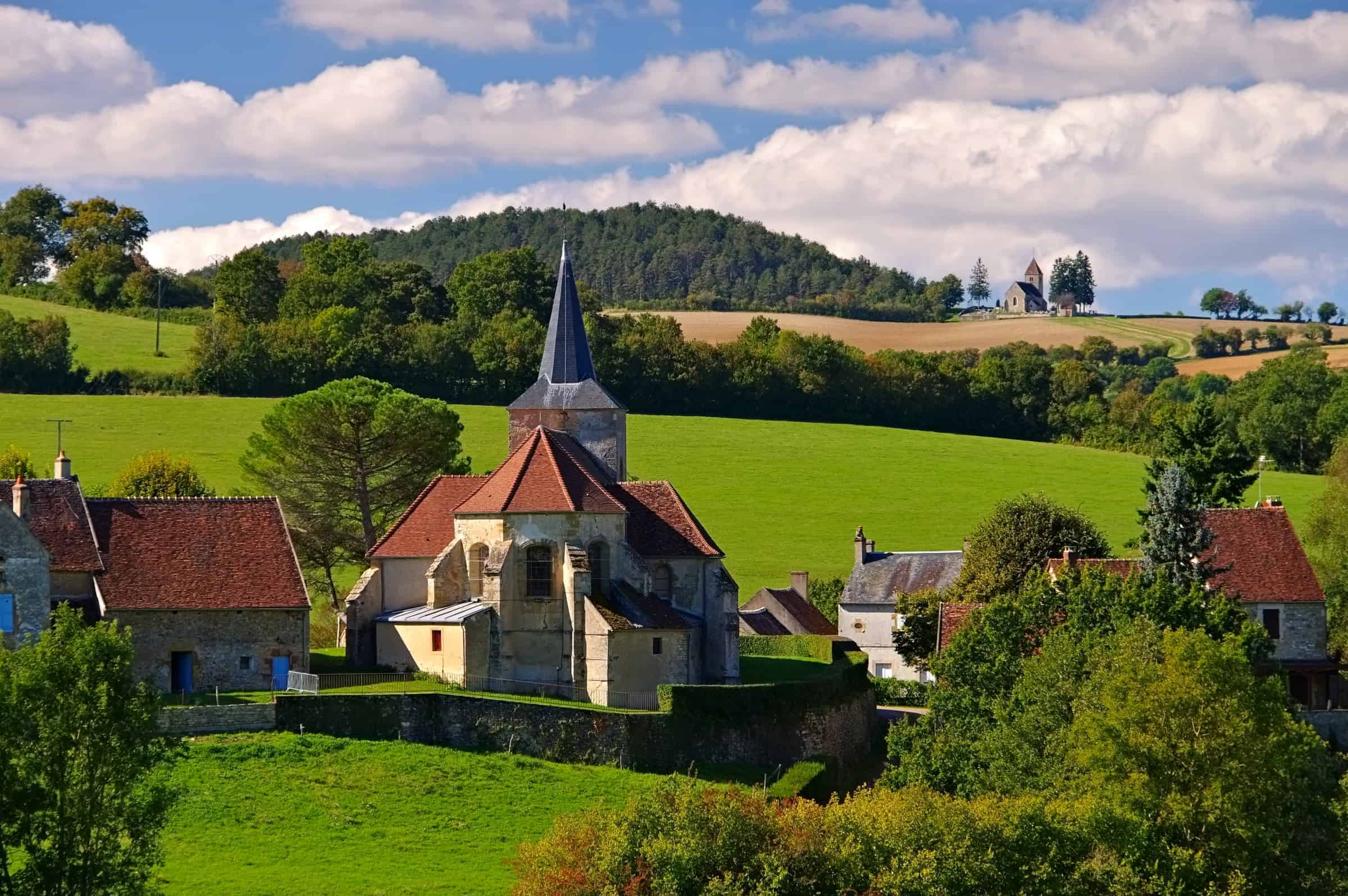
Living in rural Burgundy is like stepping back in time to old-fashioned values and community spirit. A phrase you will regularly hear when thanking neighbors for assistance or advice is “C’est normal”.
Life in rural France moves at a different pace; never expect to do anything quickly, whether it is completing a home renovation or buying a loaf of bread. Tradesmen come as and when, but viewed with the right spirit, it is part of the charm. After all, you are retired…
How much money you need to retire in Burgundy
The French Government has set minimum income requirements for British citizens wishing to apply for residency. You will find the details in our Living In France guide.
As Burgundy is not the most expensive area in France, you will find that you can live very comfortably at €1500 a month without rent. This, however, depends on your lifestyle and your buying habits.
Cost of living in Burgundy
Burgundy is not the most expensive area in France. Quite on the contrary, you might find it very affordable.
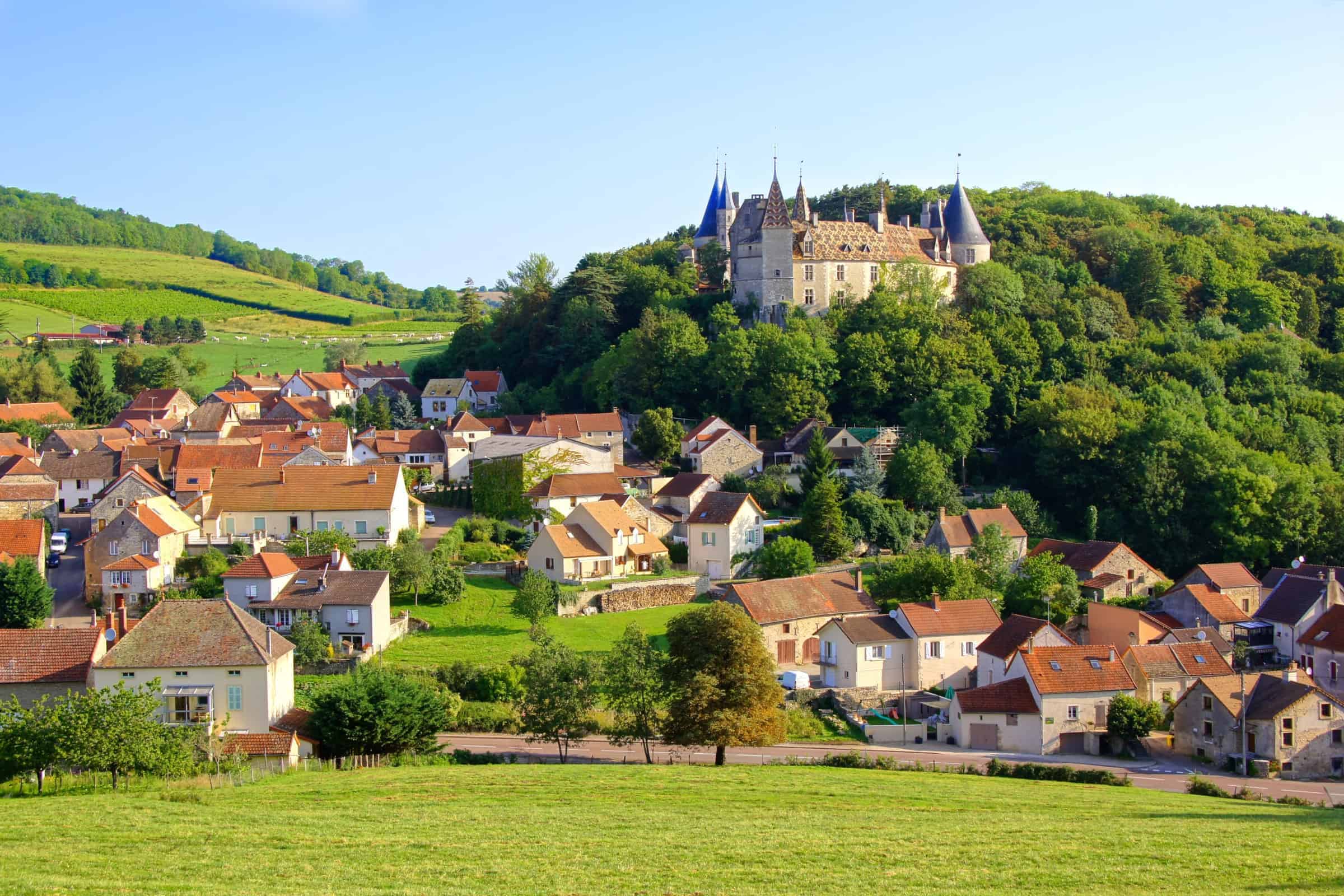
House prices can start as low as €20,000 for renovation projects, €50,000 for a 2-bedroom village property, and whatever you are willing to pay if you want a chateau!
Property prices depend on location. Around Morvan, the less popular area, properties are fairly cheap, while in the Côte d’Or, the most attractive one, prices are more expensive and the demand higher.
Some of your income will need to be allocated for health care; applying for a Carte Vitale means acceptance into the French Healthcare system, but your costs are only covered up to a maximum of 70%, so a top-up or mutuelle insurance is required.
After healthcare and household bills, food is another expense.
Food is not cheap, but the quality is generally very high. You can save money by buying local, seasonal produce at farm shops and markets.
Shopping at the local markets is a joy, a true feast for the senses.
The colorful displays of local vegetables, the smell of good cheese, and the banter of the stallholders all add to a truly enjoyable experience. And if you stop in a coffee or two at a café while watching the world go by, the experience is complete.
Eating out can be relatively inexpensive if you try the ‘menu du jour’ at lunchtime. Typically, €15 per head for a 3-course meal is standard.
Then there is the wine; a very reasonable bottle of wine can be purchased for €3 or €4; again, buy local from the producer.
A visit to a cave is another treat! Seeing where the wine is produced, along with a free wine tasting, is a great experience. Remember, don’t be in a rush. The Cote d’Or provides a wine route for serious wine buffs.
Is there a downside? Of course! French bureaucracy is famous, whether it is opening a bank account or buying a washing machine.
However, there are professional companies available to assist with applying for Carte Grise (car registration), Carte Vitale (health cards), bank accounts, etc., for reasonable fees (e.g., €35 for Carte Grise application).
If admin is really not your thing, budgeting for professional services is worth consideration.
Learning French
Obviously, unless you are already fluent in French, language may be a concern. My advice would be, don’t let it hold you back.
People are more than happy to be patient and help you along. Make your first learned phrase, “Excusez-moi, mais je ne parle pas beaucoup de Francais” and all will be well!
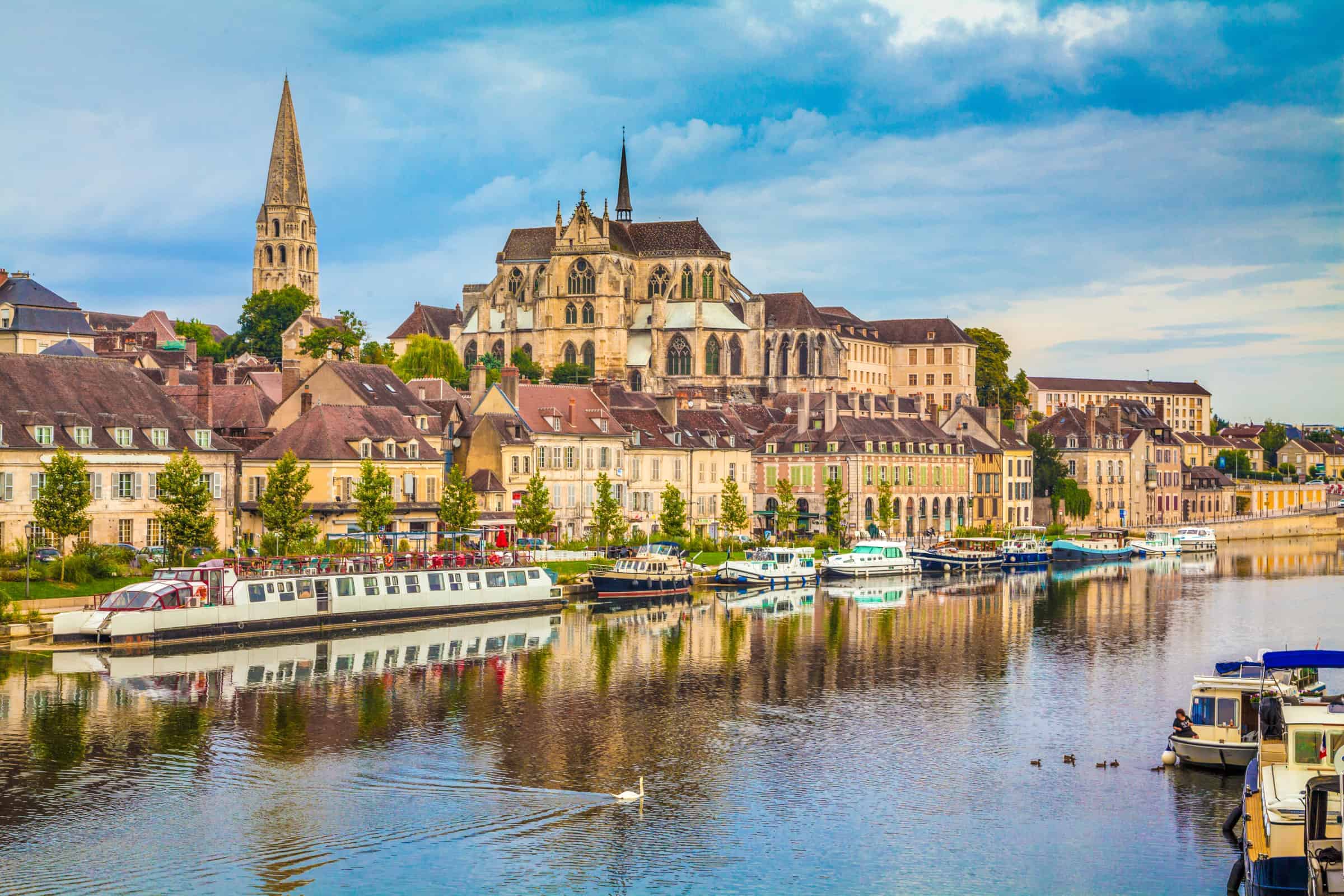
With translation apps readily to hand, most situations can be dealt with. Try to practice before you go to any appointments (bank etc.).
However, one word of warning; not all phrases work in direct translation.
One phrase to be particularly careful of is “I am hot”. Literally translated, this would be “je suis chaud”, but this phrase means something VERY different to you feeling the effect of temperature. Learning “j’ai chaud” will save any embarrassment.
Meeting other expats and making friends in Burgundy
Introduce yourselves to the Maire (Mayor); this is very important.
Each village or town has its own Mairie or town hall; local politics are big. Being friendly with the Maire is part of being accepted. The French are very formal; the Maire will expect you to introduce yourselves as a sign of respect.
Making friends is the easy part; neighbors will introduce themselves. Find the local bar or café and make it a regular haunt. Involve yourself in local events, and people will welcome you.
You will be informed of any other local expats; in our village of 500 inhabitants, there are four other British residents, two permanent and two who divide their time between France and the UK.
We were all invited to tea so that we could meet each other by a member of the village committee, a direct result of introducing ourselves to the Maire.
Leisure and activities in Burgundy
And what do you do with your leisure time? Burgundy is home to many rivers, the major river being the Saone. There are many tributaries, which are also perfect for anyone who enjoys boating, whether in a small, private vessel or a larger river cruiser.

The rivers provide the opportunity for fishing, as do the many lakes.
The Jura Mountains are at hand for anyone who enjoys skiing in the season or mountain biking or hiking. There are also opportunities for hang gliding and paragliding.
French village roads are quiet with good visibility, as the countryside is generally quite open, without too many hills for anyone who enjoys road cycling. French drivers are usually VERY courteous to cyclists.
These roads are also excellent for motorbikes, with an annual meeting of Harley Davidsons in Louhans, Bourgogne Franche-Comte. There are small, local circuits available for track days and race meets.
For four-wheel fans, there is a thriving classic car scene with frequent local meets.
If you prefer the air to the land, there are local flying clubs for light aircraft, microlights, and helicopters.
Burgundy is also a serious horse country, with the historic medieval town of Cluny being home to France’s National Stud. Visits to the stud are available, along with seasonal spectaculars and a full calendar of show jumping and horse racing.
Riding is available through the beautiful Burgundy countryside, and land is comparatively cheap to buy or rent should you wish to bring horses of your own.
Throughout the year, local, national, and international art exhibitions are held in most towns and villages for anyone with artistic tendencies. The rolling hills, historic towns, and beautiful waterways provide abundant inspiration.
The regional capital, Dijon, is the historic seat of the Dukes of Burgundy and has a rich medieval heritage. Dijon is home to one of France's oldest museums, the Musee des Beaux-Arts, as well as the Palace of the Dukes and the opulent 1614 mansion Hotel de Vogu.
The whole area is steeped in history with many local museums, demonstrating regional pride in their forebears and culture. Of course, there are also many incredible chateaux, which, in season, come alive with living history displays.
Where to live in Burgundy
Burgundy has some amazing towns, but its real beauty is found in the small rural villages and hamlets. That said, if you do go for a small village, I recommend finding one with a good local town to cover any amenities you might not have in your immediate area.
Here are some of the best places to live in Burgundy in retirement:
Cluny
As already mentioned, Cluny has some amazing horse heritage, but the town itself is beautiful. It’s a relaxed area with some great historical buildings, and everything is within walking distance, making it a great choice for active people.
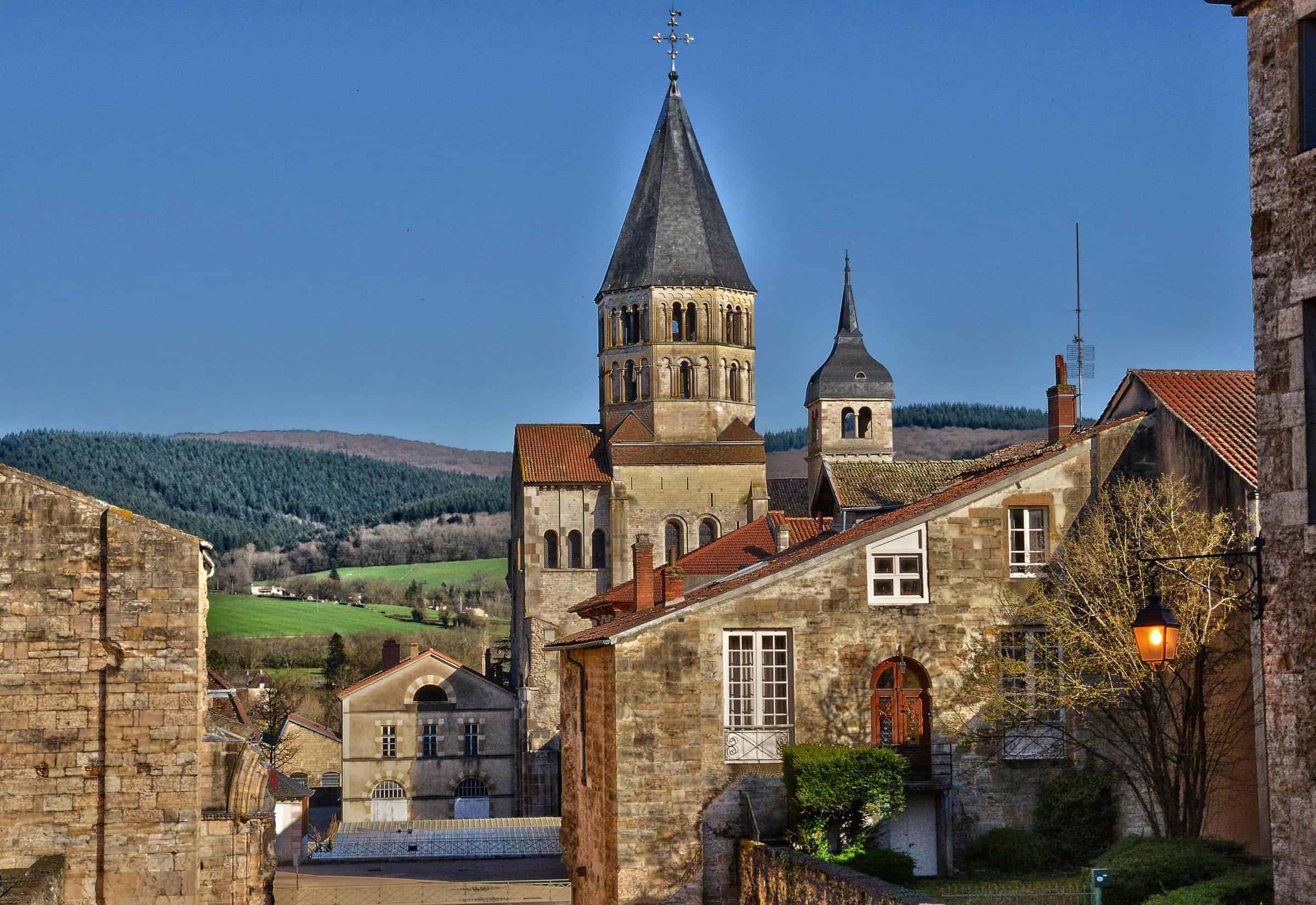
Macon
Macon is one of the larger cities in Burgundy, and it’s got some great heritage. Living on the outskirts will still give you access to everything, including the wealth of chic boutique shops and restaurants. A particular highlight is the Maison du Bois, a restaurant in the central square that’s over 500 years old.
Irancy
Irancy is firmly in wine territory and is only a short distance from the village of Chablis. You’ll find plenty of vineyards to visit, and the cherry trees in spring are a particular highlight. Irancy is a small village, and everything is walkable.
Brancion
Much of Burgundy is steeped in history, but Brancion stands out even amongst this. Parts date back to the 10th century, and the 15th-century covered market is still active. It’s incredibly rural and homely and would be a great choice for anyone who wants to capture the authentic French countryside lifestyle.
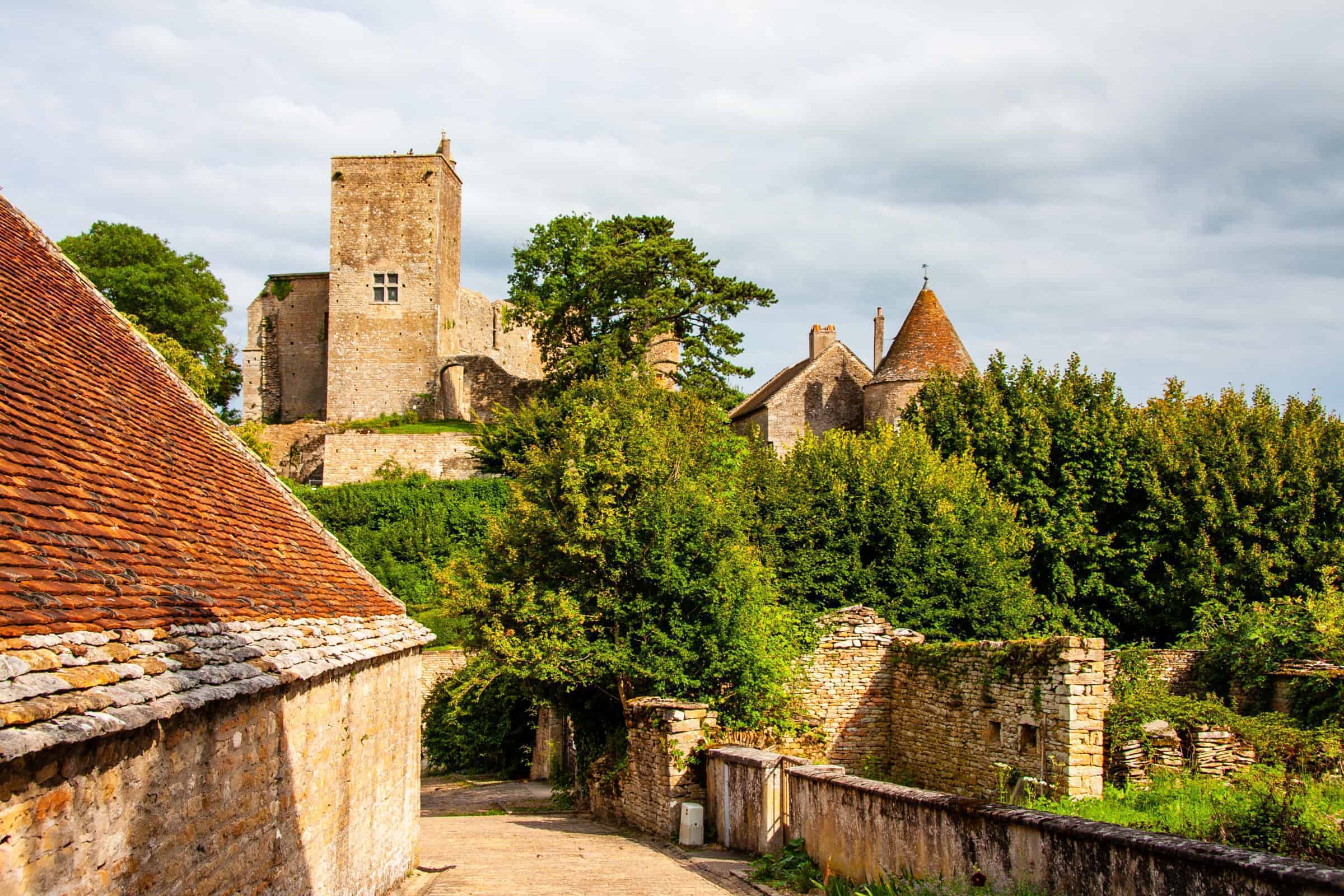
Moving to Burgundy: tips & advice
There is so much to do and to discover; a visit to the region might easily be stretched into a permanent stay.
General advice would be to be in a position to buy before you begin looking for a property.
The house-buying system in France can move very quickly. You are required to pay a 10% deposit on having any offer accepted, which is non-refundable if you later withdraw from the purchase.
However, if you are looking for a slower pace of life with true community spirit in an area steeped in history, culture, and a love of wine, there's no reason why you would ever change your mind.
If you have the money and time, tour around the area and try some of the various villages and towns to see which suits you best. Immobiliers (estate agents) have some real gems in their windows in the smaller towns, and much of the advertising is still done offline.
That said, some of the best purchasing options are simply advertised with an ‘a vendre’ sign outside; you’ll likely do much of the negotiating directly with the seller.
While it’s not a must, having some skills in home restoration can come in handy. You can buy properties ready to live in, but if you’re willing to do a bit of work, you can save a lot of money. Some restoration projects can be as cheap as €20,000, but this could be for a shell of a building!
The only other bit of advice would be to have realistic expectations. Retiring in Burgundy is different from retiring somewhere in the south of France. Burgundy is a very rural and traditional area.
This, of course, has its charm - and the communities are incredibly welcoming of Brits - but don’t expect a metropolitan lifestyle.
Final thoughts on living in Burgundy
Burgundy has almost everything you could ask for as a retirement destination: amazing local wine, great food (even among French food in general), and expansive outdoor spaces. It’ll be worth touring the area to familiarise yourself with its lifestyle and geography, but you won’t get much better value for money than what you’d find in Burgundy.
Other popular expat destinations in France to consider:
- What’s It Like Living In Brittany As An Expat
- Living In Provence
- Living On The French Riviera
- Living In The Dordogne As An Expat
- Living in Saône-et-Loire, France
- Living In Normandy
- Living In Auvergne-Rhône-Alpes, France As An Expat
You might find useful:
- Living In France Guide – everything you need to know to plan your move and settle down in France
- The Best Places to Live in France – a detailed overview of France’s most popular locations for expats
- Understanding International Health Insurance: A Comprehensive Guide
- The Expat Guide to UK Pensions Abroad – detailed information about your state, workplace, and private pensions when you retire abroad: your options, tax implications, and opportunities if you transfer your pension pot abroad or leave it in the UK.
Secure Peace of Mind with Best-Value International Health Coverage
International Citizens Insurance provide free, no-obligation quotes from the leading international health insurance providers with plans tailored to meet your needs. Trusted by thousands of expats worldwide.




